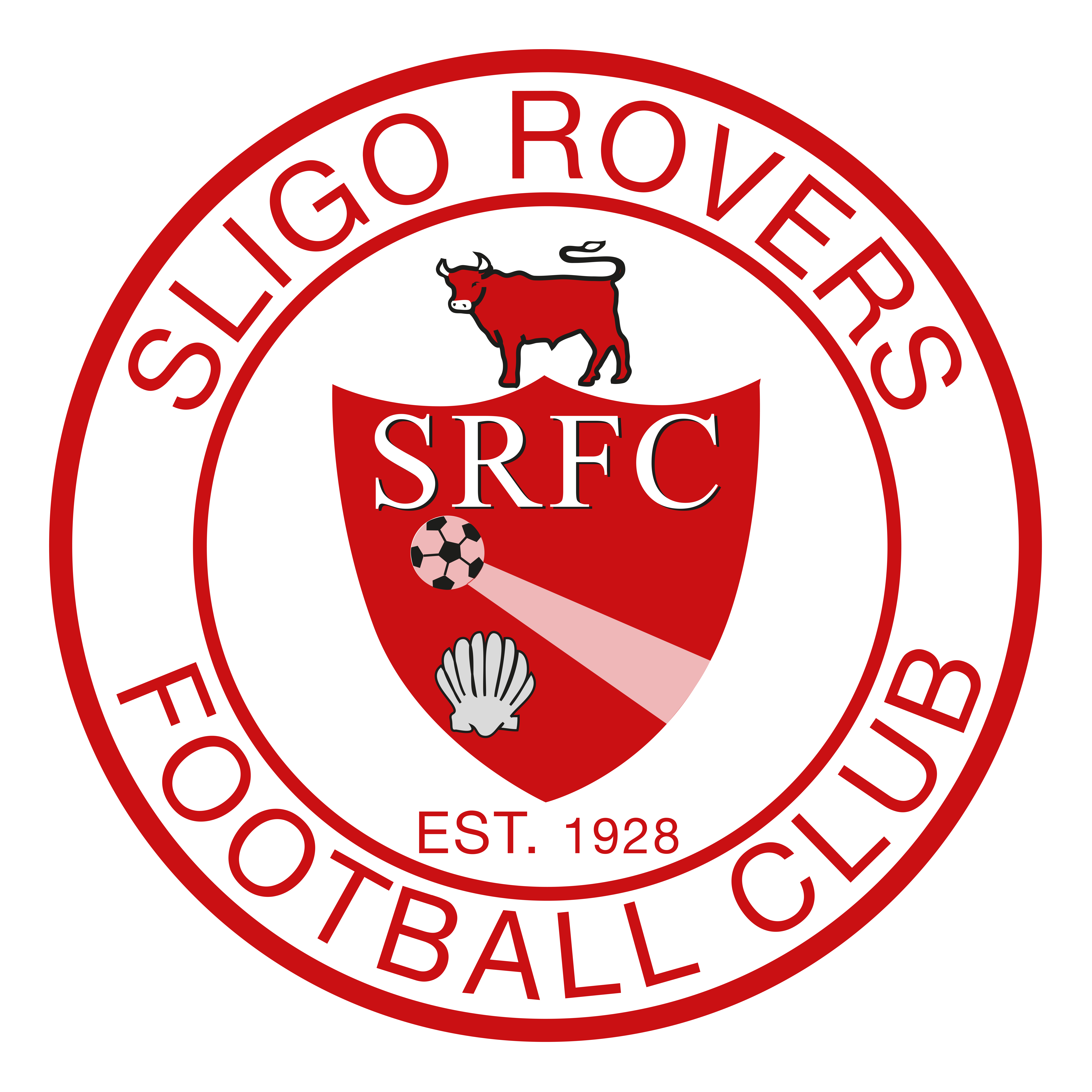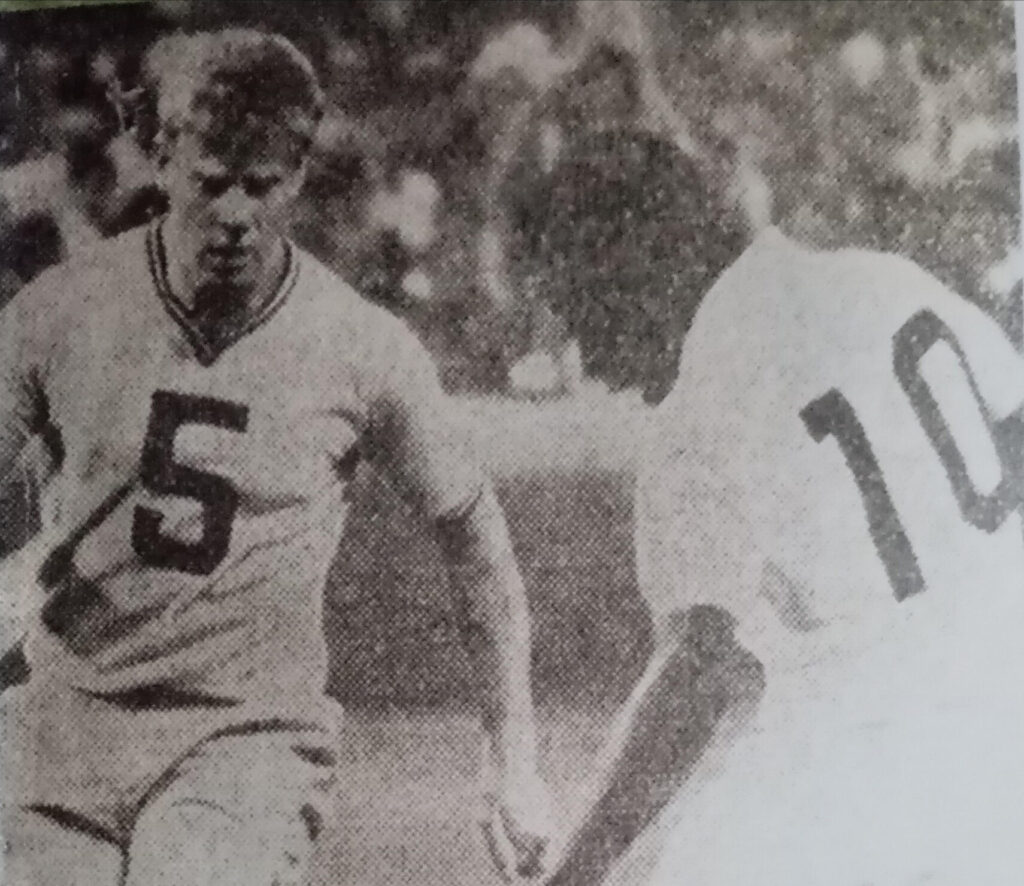In the first of an occasional series highlighting some of our local legends, Jim Gray chats with David Pugh to reflect on an iconic career.
By Jim Gray
David Pugh is one of Sligo soccer’s most iconic heroes. A local centre-half who joined Rovers from the junior soccer ranks, he is generally regarded as one of the best players ever to wear the bit’o’red and, indeed, one of the greatest of all time League of Ireland performers. He also managed Rovers on two separate occasions.
His remarkable career included an FAI Cup winner’ medal with Shamrock Rovers in 1969 and a successful spell in the fledgling American soccer leagues. But his best years were spent as an inspirational skipper with his home-town club, during which he was honoured with the captaincy of the Irish under-23 team. A master of many trades, David also played senior Gaelic football for Sligo; was an international basketball player; an accomplished rally driver, and a top amateur golfer. He was offered the chance to play professional football, but turned down opportunities to join both Celtic and Chelsea.
In a strange twist of fate, the man associated with great soccer moments also made GAA history. When the GAA finally kicked to touch its infamous ban on ‘foreign’ sports, he was among the first soccer players in the country to play in a provincial football final, alongside another Rovers favourite, Gerry Mitchell. For good measure, he captained an Irish under-23 international team where most of the players were cross-channel professionals. He drove a lightning- fast car at break-neck speeds at motor rallies all over the country. He played in three West of Ireland golf championships off an eye-watering three handicap. He won a Sigerson Cup and played basketball for Ireland.
His love of sport manifested early and he was always a dual player: “We weren’t allowed play soccer in school, so it was Gaelic football in St. John’s School in Temple Street and soccer in the nun’s field, where the Cranmore housing estate was later established,” he recalls.
Later in life, those fields of dreams would become the Showgrounds and Croke Park and countless other sports arenas, but the odd thing about a lad with such awesome ability was that his natural gifts were never matched by extravagant ambition. On the pitch, he was an unbeatable goliath, but outside the sidelines there reigned a shy and introverted youngster.
He vividly recalls ‘shaking like a leaf’ in his early days in the Rovers dressing rooms. On one occasion the club’s wily trainer, James Tiernan, offered him a plastic bag into which he could spill his nerves and told him he’d be ok once the game started. He was right. The young center-half had a blinder.
Perhaps it was that inherent shyness which influenced his decision not to join Celtic as a teenager and, some years later, to reject Chelsea’s advances. But there are no regrets.
The Celtic offer came after a month-long trial arranged by Sean Fallon when Pugh was a fourth-year student at Summerhill College. Chelsea’s approach came following a successful season with Boston Beacons in 1968.
“At Celtic, I was just a kid. I looked around at the great players they had, people like Billy McNeill and Paddy Crerand, and I decided I didn’t belong there. I asked myself what am I doing here. They asked me to sign and without hesitation I said no. Looking back, it was probably a lack of self-belief.
“With Chelsea, it was a more mature decision. I was a grown man with plenty of experience behind me. It was at the end of the season with Boston Beacons, and the manager, Jack Mansell, told me he could lift the phone and have me at Chelsea in the morning. I told him ‘I don’t think so’. He was flabbergasted, but it just wasn’t for me. I didn’t want that lifestyle.”
Instead, his Boston room-mate, Paddy Mulligan signed for Chelsea and enjoyed a prolonged career in the English First Division and with Ireland.
All Pugh ever wanted was play for Sligo Rovers. His uncle, Ray Foley, had brought him to the Showgrounds every Sunday and soon he was caught up in the frenzy which envelopes almost every Sligo town child who ever kicked a ball. As a teenager, he played for Collegians in the junior league and was good enough to win an Irish junior cap. It was only a matter of time before the senior club came calling, but it was an inauspicious start.
Rovers had just returned to senior football in 1963 after a year’s absence and their ‘new’ team was a mixture of Dublin based veterans and untried locals, but the Sligo lads were very often at the back of the queue when it came to selection.
Pugh recalls: “I was all set for my debut, togged out in the dressing room, nervous but excited. My dad, uncles, brothers all there to see me play for Rovers, a big day for the family. Then, shortly before kick-off, the manager arrives in with a few Dublin lads off the train. ‘You won’t be needed today’, he tells me. I was absolutely devastated, heartbroken, but that’s the way it was in those days. Locals would get one game and never be heard of again once there were enough Dubs to fill the shirts. I was determined from very early on that it wouldn’t happen to me, and once I got my chance I made sure they couldn’t shift me.”
Regularly picked for inter-league teams in the following years, his stock rose significantly when he was selected to captain a star-studded under-23 international team against France at Dalymount Park in 1966.
At the start of the 68/69 season, he joined a Shamrock Rovers team laden with talent, and he slotted in comfortably alongside some of the greatest players ever to grace the league under the expert management of the legendary Liam Tuohy. A memorable season with the Hoops was capped by the club’s record-breaking sixth successive FAI Cup victory, with Pugh becoming only the second Sligoman ever to win a cup medal.
The following season he was back with his hometown club and back in an FAI Cup final, as Rovers reached the decider for the first time in 30 years. A three-game marathon was eventually won by Bohemians. In the second replay, following a collision with fellow defender, Kevin Fallon, Pugh finished the game concussed and confused. It would be two hours after the game before he realized the result had gone against Rovers.
One of the better days, however, was when he got the chance to share a field with the fabulous Pele, winner of three World Cup medals and acknowledged as the best player in the world. Pugh was midway through a one-year contract with Boston Beacons, who faced Pele’s club, Santos, in an exhibition game.
It still feels slightly surreal: “I was casually told ‘you pick up Pele’, and I thought ‘yeah, no problem’. Just to be on the same pitch was such a thrill. All of the Santos players were Brazilian internationals, fabulous players. I would have paid in to see them and here I was on the same pitch, trying to keep Pele quiet. I actually won a few headers from him, but even to get close to him was hard enough.
“The one regret is that I didn’t get his shirt. Our manager ran on after the match and grabbed it. I’ve never forgiven him for that.”
When the GAA voted to abolish the ban on foreign games – ironically Sligo was one of only two counties who objected – another intriguing chapter opened up for Pugh. A talented if under-utilised Gaelic footballer, he had won a Sigerson Cup with St. Joseph’s College, Belfast, where he was doing his PE teacher training, scoring a spectacular goal in the final at Croke Park. Sligo manager, Brendan McCauley, invited Pugh and his Rovers pal, Gerry Mitchell, to join the county panel in 1971. They reached the Connacht final, losing out to Galway after a replay, in which Pugh scored a goal with a bullet-like shot from a 14-yards free.

Later in his career, he would serve as Rovers manager for two separate spells, while more tangible success as a coach came during his 28 years as a PE teacher at Summerhill College, where his teams won 18 Connacht titles and five All-Irelands. More than a dozen of his proteges went on to play in the League of Ireland and further afield.
As he reflects on an amazing sporting life well lived, Pugh has only one lingering regret
“I’ve been very lucky. As a young child, I could never have imagined I’d get to do so much in so many different sports, and I’m thankful for all of that. But, if I could change one thing, it would be to have won something with Sligo Rovers. That would have been the pinnacle.”
*This article contains extracts from the book: LOCAL HEROES: A CELEBRATION OF SLIGO SPORT by Jim Gray and Leo Gray.


